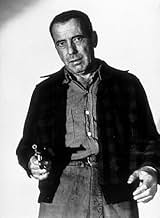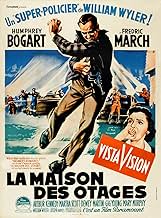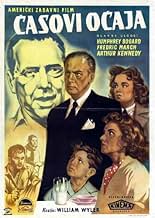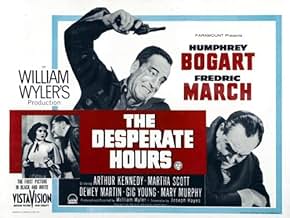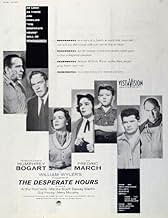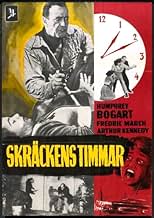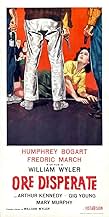IMDb-BEWERTUNG
7,4/10
11.498
IHRE BEWERTUNG
Füge eine Handlung in deiner Sprache hinzuThree escaped convicts move in on and terrorize a suburban household.Three escaped convicts move in on and terrorize a suburban household.Three escaped convicts move in on and terrorize a suburban household.
- Auszeichnungen
- 2 Gewinne & 1 Nominierung insgesamt
Walter Baldwin
- George Patterson
- (Nicht genannt)
John Benson
- Bellboy
- (Nicht genannt)
Paul E. Burns
- Chef at Al's Dining Room
- (Nicht genannt)
Edmund Cobb
- Mr. Walling
- (Nicht genannt)
Empfohlene Bewertungen
Dan Hilliard and his family are perfect Americans, corresponding admirably to the bourgeois ideal. The two children are bright, good-looking and obedient. Cindy is about 20 and is going steady with an attorney who owns a sports car. Ralphy is eight or so, all plaid shirts, jeans and attitude. He has a baseball mitt and a bicycle. Ellie, Dan's wife, runs their spotless home with quiet efficiency. Everything is in its place. Trash collectors call at fixed times. Breakfast is a serene family ritual. The Hilliards' home life is as balanced, as regular and as dull as the barometer on the wall. As for Dan Hillier himself, he has attained that mythic status to which all 1950's bourgeois males aspired - he is an executive. The middle classes don't want adventure in their lives, they want predictability. And this is the perfect, dream-like state in which the Hilliards pass their anodyne existence, secure in their suburban womb - until the American Nightmare is unleashed upon them.
What if members of The Underclass, with their dirty, unshaven physicality and their sagging, torn clothes should irrupt into the suburbs? What if, by some catastrophic failure, the police and the prison service can't keep The Underclass in its designated containers? How will nice folks like the Hilliards cope if confronted by these alien beings?
There has been a jailbreak. The citizens of Indianapolis have been warned to watch out for three desperadoes - the two Griffin brothers and their accomplice Kobish. Little do the Hilliards realise as they go about their tranquil suburban lives, but the fugitives are about to choose the Hilliard home as a place to hole up ...
Like "Suddenly", made a year earlier, this is a 'bad guys invaded my home' movie. The downside of bourgeois affluence is the fear that the disenfranchised masses will come to take away your goodies.
Humphrey Bogart was in his late 50's and clearly ailing when he played the part of Glenn Griffin, the leader of the fugitive trio. He would make only two more films in the short time that was left to him. Dewey Martin, 26 years his junior, plays his kid brother Hal.
More than anything, "The Desperate Hours" is a film about social class. "You can't play ball with savages like that," opines a Madison County detective. Glenn holds his social superiors in equal contempt, calling them "smart-eyed respectable suckers". He warns Hal not to expect any favours from the class enemy: "Guys like Hilliard ever give you a fair shake?" Much play is made of linguistic markers which separate the educated from the rest ('whom' instead of 'who'), and contrasts in table manners between the refined Hilliards and their thuggish captors. Glenn lashes out against the tea tray, that emblem of middle-class gentility, and the virginal Cindy, whom he urges Hal to 'take'.
Dire though the Hilliards' predicament may be, they are not alone. They are exactly the kind of people the forces of law and order exist to protect and serve, and it is not long before Madison County's finest and the FBI are closing in on the fugitives. And the cops have science on their side. They can tap the phone of Glenn's girlfriend in Pittsburgh, and tail her across America as she heads for the rendezvous. In the police station, the humming wires never rest as technology narrows down the bad guys' options.
Middle-class sensibility is all-pervasive. Chuck and Cindy argue near the sports car, but break off abruptly when two people pass by. No matter how deeply the emotions may run, it isn't seemly to fight in front of the neighbours. Dan's secretary can tell, from nuances of his behaviour, that something is very wrong. Similarly, the trashman senses that things are amiss with Ellie by the quality of her chat. We see Cindy admiring her curves in front of the hallway mirror, because it is important that she be sexually desirable (so that the fugitives will regard her as a chattle). Chuck, however, has to remain sexually thwarted, because his behaviour is bound by rigid bourgeois restrictions. We see him raise the arm-rest in his sports car in the hope of a grappling session with Cindy, then lowering it dejectedly when he realises that his luck is out. Dan's wave to Chuck to cross the threshold is a symbolic acceptance of him as a son-in-law. He has made it into The Family.
Light represents goodness. Cindy comes home after another chaste date with Chuck and is bathed in bright light on the doorstep. Dan and Ellie declare their love for each other, their bodies lit intensely in an otherwise black bedroom. The searchlights of the police, and the bad guys' vain attempts to eradicate them, show us figuratively what we yearn to see - that good will always triumph over social disruption.
The overpowering of Ellie, the smashing of Ralphy's toy plane and the collapse of Cindy all happen on the same spot and are all filmed from the same low angle. These dramatic incidents show the Hilliards at bay, and the unusual vantage-point stresses the 'wrongness' of what is happening.
Implausibilities abound throughout the movie. How likely is it that the front door would be left unlocked, that Chuck would reach the house ahead of the cops, or that Dan would insist on carrying a gun, then empty its clip? Why would he hesitate to call the police in, once he got the upper hand? Why would everyone leave the family unattended, moments after the conclusion of a violent and dramatic siege?
And yet it works. Glenn's love of his brother breaks through his tough-guy facade, and after he gives his guns away he undergoes a tragic 'King Lear' moment of self-realisation. These are powerful moments in a powerful film.
What if members of The Underclass, with their dirty, unshaven physicality and their sagging, torn clothes should irrupt into the suburbs? What if, by some catastrophic failure, the police and the prison service can't keep The Underclass in its designated containers? How will nice folks like the Hilliards cope if confronted by these alien beings?
There has been a jailbreak. The citizens of Indianapolis have been warned to watch out for three desperadoes - the two Griffin brothers and their accomplice Kobish. Little do the Hilliards realise as they go about their tranquil suburban lives, but the fugitives are about to choose the Hilliard home as a place to hole up ...
Like "Suddenly", made a year earlier, this is a 'bad guys invaded my home' movie. The downside of bourgeois affluence is the fear that the disenfranchised masses will come to take away your goodies.
Humphrey Bogart was in his late 50's and clearly ailing when he played the part of Glenn Griffin, the leader of the fugitive trio. He would make only two more films in the short time that was left to him. Dewey Martin, 26 years his junior, plays his kid brother Hal.
More than anything, "The Desperate Hours" is a film about social class. "You can't play ball with savages like that," opines a Madison County detective. Glenn holds his social superiors in equal contempt, calling them "smart-eyed respectable suckers". He warns Hal not to expect any favours from the class enemy: "Guys like Hilliard ever give you a fair shake?" Much play is made of linguistic markers which separate the educated from the rest ('whom' instead of 'who'), and contrasts in table manners between the refined Hilliards and their thuggish captors. Glenn lashes out against the tea tray, that emblem of middle-class gentility, and the virginal Cindy, whom he urges Hal to 'take'.
Dire though the Hilliards' predicament may be, they are not alone. They are exactly the kind of people the forces of law and order exist to protect and serve, and it is not long before Madison County's finest and the FBI are closing in on the fugitives. And the cops have science on their side. They can tap the phone of Glenn's girlfriend in Pittsburgh, and tail her across America as she heads for the rendezvous. In the police station, the humming wires never rest as technology narrows down the bad guys' options.
Middle-class sensibility is all-pervasive. Chuck and Cindy argue near the sports car, but break off abruptly when two people pass by. No matter how deeply the emotions may run, it isn't seemly to fight in front of the neighbours. Dan's secretary can tell, from nuances of his behaviour, that something is very wrong. Similarly, the trashman senses that things are amiss with Ellie by the quality of her chat. We see Cindy admiring her curves in front of the hallway mirror, because it is important that she be sexually desirable (so that the fugitives will regard her as a chattle). Chuck, however, has to remain sexually thwarted, because his behaviour is bound by rigid bourgeois restrictions. We see him raise the arm-rest in his sports car in the hope of a grappling session with Cindy, then lowering it dejectedly when he realises that his luck is out. Dan's wave to Chuck to cross the threshold is a symbolic acceptance of him as a son-in-law. He has made it into The Family.
Light represents goodness. Cindy comes home after another chaste date with Chuck and is bathed in bright light on the doorstep. Dan and Ellie declare their love for each other, their bodies lit intensely in an otherwise black bedroom. The searchlights of the police, and the bad guys' vain attempts to eradicate them, show us figuratively what we yearn to see - that good will always triumph over social disruption.
The overpowering of Ellie, the smashing of Ralphy's toy plane and the collapse of Cindy all happen on the same spot and are all filmed from the same low angle. These dramatic incidents show the Hilliards at bay, and the unusual vantage-point stresses the 'wrongness' of what is happening.
Implausibilities abound throughout the movie. How likely is it that the front door would be left unlocked, that Chuck would reach the house ahead of the cops, or that Dan would insist on carrying a gun, then empty its clip? Why would he hesitate to call the police in, once he got the upper hand? Why would everyone leave the family unattended, moments after the conclusion of a violent and dramatic siege?
And yet it works. Glenn's love of his brother breaks through his tough-guy facade, and after he gives his guns away he undergoes a tragic 'King Lear' moment of self-realisation. These are powerful moments in a powerful film.
These are the times when danger looks us in the face, when terror, torment, tyranny lends an embrace, as all we cherish and endear, goes toe to toe with every fear, and the world that was secure, falls out of place. When every movement of the clock is an attack, facades of life engraved with fractures, widened cracks - tremors, trembles, quaking dread, in not too long, you might be dead, as the desperation reaches, a climax.
It's of its time but it does still stand up to be counted all these years later, with superb performances throughout, especially HB, who as an actor matured with magnificence in the latter years of his movie making career.
It's of its time but it does still stand up to be counted all these years later, with superb performances throughout, especially HB, who as an actor matured with magnificence in the latter years of his movie making career.
It deals with three escaped convicts , on the run from the law, move into a married couple's house and takes over their lives. As a Psychotic criminal, Glen Griffin's about to go on trial escapes from his pursuers . As a trio (Humphrey Bogart , Dewey Martin , Robert Middleton) try to make their getaway . They hide out at the house of a good family, the Hilliard formed by the uprighter father (Fredric March) , mother (Martha Scott) , the teen daughter (Mary Murphy) and a little boy (Richard Eyer). Now it appears the Hilliards have problems of their own. A reign of violence sweeps the screen.The First Picture in Black and White VistaVision. At the height of fear every moment is a desperate hour.Glen Griffin is looking for a place to call home... Just for a few hours.Who is stronger? A psychopath who feeds on terror? Or a father driven by fear? Only time will tell.Desire is the deadliest weapon of all.
A nice thriller based on a ful play and the result is a taut , suspenseful , twisted movie , made with a wonderful cast and all the expertise and power at Wiliiam Wyler's command . Joseph Hayes, the source novelist and playwright of the 1954 novel and 1955 play, also wrote the screenplay for Horas desesperadas (1955), and also co-wrote the script for this version.The source stage play was a box-office smash hit on Broadway, and won Tony Awards for Best Play and Best Direction for Robert Montgomery. The original Broadway production of "The Desperate Hours", written by Joseph Hayes opened on February 10, 1955, at the Ethel Barrymore Theater, where it ran for two hundred twelve performances until August 13, 1955. The play had previously opened in New Haven's Shubert Theatre in 1955, before re-launching on Broadway in August 1955. This classic The desperate hours (1955) had an inferior remake being released thirty-five years later in 1990 directed by Michael Cimino with Michael Rourke , Anthony Hopkins , Mimi Rogers , Kelly Lynch , Shawnee Smith . This movie was the third English language version of the story, being released twenty-three years after the television movie version , though the latter was critically poorly received and was a commercial failure at the box-office; however the vintage Bogart rendition received awesome critics.
The motion picture was compellingly directed by the maestro William Wyler . Wyler was considered by his peers as second only to John Ford as a master craftsman of cinema and the winner of three Best Director Academy Awards . Wyler was a great professional who had a career full of successes in all kind of genres as Film Noir : ¨Detective story¨ , ¨The desperate hours¨ , ¨Dead End¨ ; Western : ¨The Westener¨, ¨Friendly persuasion¨ , ¨Big Country¨ , but his speciality were dramas as : ¨Jezebel¨ , ¨The letter¨ , ¨Wuthering Heights¨ , ¨The best years of our lives¨, ¨Mrs Miniver¨, ¨The heiress¨ , ¨the little Foxes¨ , ¨The collector¨ and Comedy as two films starred by Audrey Hepburn : ¨How to steal a million¨ and of course ¨Roman's holiday¨ with Audrey at her Oscar-winning best and immortal comedy-romance. This ¨Desperate hours has a rating 7.5/10, better than average , well worth watching .
A nice thriller based on a ful play and the result is a taut , suspenseful , twisted movie , made with a wonderful cast and all the expertise and power at Wiliiam Wyler's command . Joseph Hayes, the source novelist and playwright of the 1954 novel and 1955 play, also wrote the screenplay for Horas desesperadas (1955), and also co-wrote the script for this version.The source stage play was a box-office smash hit on Broadway, and won Tony Awards for Best Play and Best Direction for Robert Montgomery. The original Broadway production of "The Desperate Hours", written by Joseph Hayes opened on February 10, 1955, at the Ethel Barrymore Theater, where it ran for two hundred twelve performances until August 13, 1955. The play had previously opened in New Haven's Shubert Theatre in 1955, before re-launching on Broadway in August 1955. This classic The desperate hours (1955) had an inferior remake being released thirty-five years later in 1990 directed by Michael Cimino with Michael Rourke , Anthony Hopkins , Mimi Rogers , Kelly Lynch , Shawnee Smith . This movie was the third English language version of the story, being released twenty-three years after the television movie version , though the latter was critically poorly received and was a commercial failure at the box-office; however the vintage Bogart rendition received awesome critics.
The motion picture was compellingly directed by the maestro William Wyler . Wyler was considered by his peers as second only to John Ford as a master craftsman of cinema and the winner of three Best Director Academy Awards . Wyler was a great professional who had a career full of successes in all kind of genres as Film Noir : ¨Detective story¨ , ¨The desperate hours¨ , ¨Dead End¨ ; Western : ¨The Westener¨, ¨Friendly persuasion¨ , ¨Big Country¨ , but his speciality were dramas as : ¨Jezebel¨ , ¨The letter¨ , ¨Wuthering Heights¨ , ¨The best years of our lives¨, ¨Mrs Miniver¨, ¨The heiress¨ , ¨the little Foxes¨ , ¨The collector¨ and Comedy as two films starred by Audrey Hepburn : ¨How to steal a million¨ and of course ¨Roman's holiday¨ with Audrey at her Oscar-winning best and immortal comedy-romance. This ¨Desperate hours has a rating 7.5/10, better than average , well worth watching .
Frederic March, Martha Scott, Humphrey Bogart and Arthur Kennedy are just a few of the people who endure "The Desperate Hours," a 1955 film, based on the stage play and directed by William Wyler. On Broadway, the play was directed by Robert Montgomery and starred Karl Malden in the Bogart role and Paul Newman played his brother, here played by Dewey Martin. The film also stars Gig Young, Mary Murphy, Richard Eyer, and Robert Middleton.
Having just seen Bogart in the 1936 "The Petrified Forest," it was interesting to see him still taking hostages 19 years later - and in fact, looking like he'd spent the last 19 years on the run from the law. He was clearly ill during the making of this film. Though Dewey Martin looked 30 years younger than Bogie, he was in fact only 20, making the fact that they were brothers a tiny bit more plausible.
I also had recently seen "The Star Witness," a 1931 Warner Brothers film with a similar plot, which won an Oscar for best original screenplay. By 1955, it wasn't original any longer, but the execution of the story is compelling. Martha Scott is a housewife, Ellie Hilliard, alone in her suburban home when three escaped criminals (Bogart, Martin and Middleton) take over the place. Glenn Griffin (Bogart) wants to murder the Deputy Sheriff (Arthur Kennedy) who put him in prison, and he needs to wait for the delivery of some money to make good his escape. Dan Hilliard (March) and his daughter Cynthia (Murphy) walk into the situation, followed later by the Hilliard's little boy (Eyer). You'll be wondering why the son isn't knocked off - by his parents - given the trouble he causes.
The money is delayed, and of course, the police have no idea where the gang is, as Griffin has put his car in the Hilliard garage. So the hours turn into overnight. Although March and Cynthia are allowed to leave the house for work, and Cynthia has to keep a date with her boyfriend (Young), they're too terrified to say anything for fear the mother and boy will be killed. Basically the gang as well and the family become prisoners as the hours drag on.
Wyler gives us lots of frightening and suspenseful moments as the tension builds in the house, and he never lets the pace drag. Supposedly he made March and Scott do a goodbye scene for take after take because he thought March was "acting" and wanted to tire him out. An accomplished stage actor of the old school, March consistently had a great presence but didn't always emotionally connect with his characters - he does here. March and Bogart make powerful adversaries, March hitting just the right note as an angry father afraid for his family, but not afraid to talk back to Griffin. Bogart's Griffin is shrewd and admires brains and bravery in others; the family impresses him with their guts.
Bogart is marvelous in the role - though tired out, his character is determined to keep the gang together and free; he's resentful of the middle classness of the family and how out of place he and his gang are in a nice home. Unlike his Duke Mantee in "The Petrified Forest", Bogart's Griffin doesn't seem to have a sense of the hopelessness of his situation until the very end; also unlike Duke Mantee, he has a vulnerability that he demonstrates at the end.
Robert Middleton gives a scary performance as a witless member of the gang, and Martin, as Hal, displays Hal's disillusionment with the situation, his attraction to Cynthia, and the realization that he can never have someone like her if he continues down his brother's road. Gig Young is somewhat wasted as Cythia's boyfriend - it's unnecessary star casting. Martha Scott does a terrific job as the harried wife and mother. The wonderful Arthur Kennedy gives another good performance as the sheriff determined to catch Griffin.
Highly recommended for its suspenseful story, fine direction, and top performances.
Having just seen Bogart in the 1936 "The Petrified Forest," it was interesting to see him still taking hostages 19 years later - and in fact, looking like he'd spent the last 19 years on the run from the law. He was clearly ill during the making of this film. Though Dewey Martin looked 30 years younger than Bogie, he was in fact only 20, making the fact that they were brothers a tiny bit more plausible.
I also had recently seen "The Star Witness," a 1931 Warner Brothers film with a similar plot, which won an Oscar for best original screenplay. By 1955, it wasn't original any longer, but the execution of the story is compelling. Martha Scott is a housewife, Ellie Hilliard, alone in her suburban home when three escaped criminals (Bogart, Martin and Middleton) take over the place. Glenn Griffin (Bogart) wants to murder the Deputy Sheriff (Arthur Kennedy) who put him in prison, and he needs to wait for the delivery of some money to make good his escape. Dan Hilliard (March) and his daughter Cynthia (Murphy) walk into the situation, followed later by the Hilliard's little boy (Eyer). You'll be wondering why the son isn't knocked off - by his parents - given the trouble he causes.
The money is delayed, and of course, the police have no idea where the gang is, as Griffin has put his car in the Hilliard garage. So the hours turn into overnight. Although March and Cynthia are allowed to leave the house for work, and Cynthia has to keep a date with her boyfriend (Young), they're too terrified to say anything for fear the mother and boy will be killed. Basically the gang as well and the family become prisoners as the hours drag on.
Wyler gives us lots of frightening and suspenseful moments as the tension builds in the house, and he never lets the pace drag. Supposedly he made March and Scott do a goodbye scene for take after take because he thought March was "acting" and wanted to tire him out. An accomplished stage actor of the old school, March consistently had a great presence but didn't always emotionally connect with his characters - he does here. March and Bogart make powerful adversaries, March hitting just the right note as an angry father afraid for his family, but not afraid to talk back to Griffin. Bogart's Griffin is shrewd and admires brains and bravery in others; the family impresses him with their guts.
Bogart is marvelous in the role - though tired out, his character is determined to keep the gang together and free; he's resentful of the middle classness of the family and how out of place he and his gang are in a nice home. Unlike his Duke Mantee in "The Petrified Forest", Bogart's Griffin doesn't seem to have a sense of the hopelessness of his situation until the very end; also unlike Duke Mantee, he has a vulnerability that he demonstrates at the end.
Robert Middleton gives a scary performance as a witless member of the gang, and Martin, as Hal, displays Hal's disillusionment with the situation, his attraction to Cynthia, and the realization that he can never have someone like her if he continues down his brother's road. Gig Young is somewhat wasted as Cythia's boyfriend - it's unnecessary star casting. Martha Scott does a terrific job as the harried wife and mother. The wonderful Arthur Kennedy gives another good performance as the sheriff determined to catch Griffin.
Highly recommended for its suspenseful story, fine direction, and top performances.
A lot of loopy comments out there about this one. "Predictable" is a very over-used adjective that I've certainly been guilty of myself, but what exactly is supposed to happen in a hostage-taking, domestic thriller like this? Are aliens supposed to land in the Hilliards' back yard and vaporize everyone? Is Bogart's escaped con supposed to dress up in drag at some point and decide he wants to become a chorus girl? Would that satisfy those who find this movie predictable?
"The Desperate Hours" keeps you on the edge of your seat; it more than passes the test as a thriller and it most certainly has not mellowed over time. The script is fine, intelligently examining how the respectably middle class but somewhat complacent father (Frederic March) draws strength and courage from the love of his wife and kids in handling the ordeal. Though each family member is formulating their own strategy for how best to resolve the crisis (their brains are always going "clickity-clickity-click" as Bogart mockingly keeps reminding them) they recognize March as the father and as such the captain of the ship. They look to him for leadership and he responds. It's telling that when the young son disobediently puts his ill-conceived plan into action, it undermines the father's nearly successful tactic. Though he had earlier suspected his dad of being cowardly for not taking a more aggressive stance, from this point on he begins to appreciate all the variables he must take into account and looks up to him once more. The idealized, but by no means wildly unrealistic domestic situation reflects the mood of the time. Why on earth would it possibly reflect cynically 90's attitudes and sensibilities, as some reviewers seem to desire?
There are casting decisions pertaining to age differences which raise an eyebrow, but do not seriously detract from William Wyler's (as masterful and dependable a director as Hollywood has ever cranked out) otherwise polished production. At 42 of course, Gig Young seems a tad old for the family's 19 year old daughter (beautiful Mary Murphy) but he's still youthful enough looking and he puts an interesting spin on what is usually the thankless role of the boyfriend who stumbles into things. One of the beauties of B&W photography is that it can always be used to make actors look as many as 5-15 years younger than they are. This comes into play with Bogart's character as well, as he's asked to be the older brother of 32 year old Dewey Martin, and it's something that I didn't have too hard a time buying. It's difficult to believe this was one of his last films, as he seems quite vigorous and robust in the part.
Tense, exciting, well-acted and directed; this is indisputably far superior to Michael Cimino's bloody and botched 1990 Mickey Rourke "star" vehicle remake.
"The Desperate Hours" keeps you on the edge of your seat; it more than passes the test as a thriller and it most certainly has not mellowed over time. The script is fine, intelligently examining how the respectably middle class but somewhat complacent father (Frederic March) draws strength and courage from the love of his wife and kids in handling the ordeal. Though each family member is formulating their own strategy for how best to resolve the crisis (their brains are always going "clickity-clickity-click" as Bogart mockingly keeps reminding them) they recognize March as the father and as such the captain of the ship. They look to him for leadership and he responds. It's telling that when the young son disobediently puts his ill-conceived plan into action, it undermines the father's nearly successful tactic. Though he had earlier suspected his dad of being cowardly for not taking a more aggressive stance, from this point on he begins to appreciate all the variables he must take into account and looks up to him once more. The idealized, but by no means wildly unrealistic domestic situation reflects the mood of the time. Why on earth would it possibly reflect cynically 90's attitudes and sensibilities, as some reviewers seem to desire?
There are casting decisions pertaining to age differences which raise an eyebrow, but do not seriously detract from William Wyler's (as masterful and dependable a director as Hollywood has ever cranked out) otherwise polished production. At 42 of course, Gig Young seems a tad old for the family's 19 year old daughter (beautiful Mary Murphy) but he's still youthful enough looking and he puts an interesting spin on what is usually the thankless role of the boyfriend who stumbles into things. One of the beauties of B&W photography is that it can always be used to make actors look as many as 5-15 years younger than they are. This comes into play with Bogart's character as well, as he's asked to be the older brother of 32 year old Dewey Martin, and it's something that I didn't have too hard a time buying. It's difficult to believe this was one of his last films, as he seems quite vigorous and robust in the part.
Tense, exciting, well-acted and directed; this is indisputably far superior to Michael Cimino's bloody and botched 1990 Mickey Rourke "star" vehicle remake.
Wusstest du schon
- WissenswertesThe character of Glenn Griffin was made older so Humphrey Bogart could play the role. The stage version starred Karl Malden and a young Paul Newman in the Bogart role.
- PatzerBefore Glenn asks Eleanor if she could make a phone call without crying, he puts his left hand in his pocket. When she stands up and walks to the phone, he puts the same hand in the pocket again.
- Zitate
[first lines]
[the morning newspaper hits the front door]
Ellie Hilliard: I'll get it, darling.
Daniel Hilliard: [about the newspaper boy's routine of always hitting the front door with the newspaper] Some morning I'm gonna catch up with that kid.
Top-Auswahl
Melde dich zum Bewerten an und greife auf die Watchlist für personalisierte Empfehlungen zu.
- How long is The Desperate Hours?Powered by Alexa
Details
- Erscheinungsdatum
- Herkunftsland
- Sprache
- Auch bekannt als
- The Desperate Hours
- Drehorte
- Produktionsfirma
- Weitere beteiligte Unternehmen bei IMDbPro anzeigen
Box Office
- Budget
- 2.388.000 $ (geschätzt)
- Laufzeit
- 1 Std. 52 Min.(112 min)
- Farbe
- Seitenverhältnis
- 1.37 : 1(original ratio)
Zu dieser Seite beitragen
Bearbeitung vorschlagen oder fehlenden Inhalt hinzufügen


